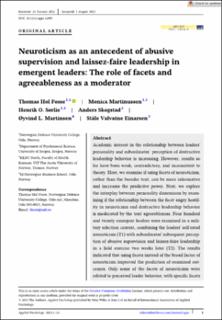| dc.contributor.author | Fosse, Thomas Hol | |
| dc.contributor.author | Martinussen, Monica | |
| dc.contributor.author | Sørlie, Henrik | |
| dc.contributor.author | Skogstad, Anders | |
| dc.contributor.author | Martinsen, Øyvind L. | |
| dc.contributor.author | Einarsen, Ståle Valvatne | |
| dc.date.accessioned | 2023-09-18T08:48:51Z | |
| dc.date.available | 2023-09-18T08:48:51Z | |
| dc.date.created | 2023-09-11T12:47:07Z | |
| dc.date.issued | 2023 | |
| dc.identifier.citation | Applied Psychology. 2023, . | en_US |
| dc.identifier.issn | 0269-994X | |
| dc.identifier.uri | https://hdl.handle.net/11250/3090002 | |
| dc.description.abstract | Academic interest in the relationship between leaders'personality and subordinates’perception of destructiveleadership behavior is increasing. However, results sofar have been weak, contradictory, and inconsistent totheory. Here, we examine if using facets of neuroticism,rather than the broader trait, can be more informativeand increases the predictive power. Next, we explorethe interplay between personality dimensions by exam-ining if the relationship between the facet angry hostil-ity in neuroticism and destructive leadership behavioris moderated by the trait agreeableness. Four hundredand twenty emergent leaders were examined in a mili-tary selection context, combining the leaders' self-ratedneuroticism (T1) with subordinates' subsequent percep-tion of abusive supervision and laissez-faire leadershipin a field exercise two weeks later (T2). The resultsindicated that using facets instead of the broad factor ofneuroticism improved the prediction of examined out-comes. Only some of the facets of neuroticism wererelated to perceived leader behavior, with specific facets | en_US |
| dc.language.iso | eng | en_US |
| dc.publisher | IAAP | en_US |
| dc.rights | Navngivelse 4.0 Internasjonal | * |
| dc.rights.uri | http://creativecommons.org/licenses/by/4.0/deed.no | * |
| dc.subject | abusive supervision | en_US |
| dc.subject | agreeableness | en_US |
| dc.subject | laissez-faire leadership | en_US |
| dc.subject | neuroticism | en_US |
| dc.subject | personality traits | en_US |
| dc.title | Neuroticism as an antecedent of abusive supervision and laissez-faire leadership in emergent leaders: The role of facets and agreeableness as a moderator | en_US |
| dc.title.alternative | Neuroticism as an antecedent of abusive supervision and laissez-faire leadership in emergent leaders: The role of facets and agreeableness as a moderator | en_US |
| dc.type | Peer reviewed | en_US |
| dc.type | Journal article | en_US |
| dc.description.version | publishedVersion | en_US |
| dc.rights.holder | The Authors | en_US |
| dc.source.pagenumber | 23 | en_US |
| dc.source.journal | Applied Psychology | en_US |
| dc.identifier.doi | 10.1111/apps.12495 | |
| dc.identifier.cristin | 2173957 | |
| cristin.ispublished | true | |
| cristin.fulltext | original | |
| cristin.qualitycode | 1 | |

